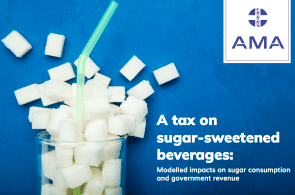The Australian Medical Association has modelled the likely effects on obesity from a tax on sugary drinks.
This report describes how overweight and obesity is a significant and growing issue in Australia. Sugar-sweetened beverages (SSBs) are a major contributor to the obesity crisis and provide almost no nutritional benefit.
With increasing population body mass index (BMI), direct healthcare costs increase, many of which are borne by government(s). A tax on SSBs would be an important first step towards tackling obesity and would raise revenue to take further steps. Modelling indicates a tax on select SSBs would reduce sugar consumption from soft drinks by 12 to 18 per cent and raise annual government revenue of $814 million to $749 million. There would be minimal impact on the sugar industry. Reduced sugar consumption and improved diet would likely lead to a reduction in the prevalence of obesity and substantial healthcare savings.
Key points:
Sugar and the cost of obesity:
- Overweight and obesity is a significant and growing issue in Australia. Sugar-sweetened beverages (SSBs) are a major contributor to the obesity crisis and provide almost no nutritional benefit.
- SSBs contain large amounts of free sugar — delivering a high number of liquid calories but providing almost no nutritional benefit. There are 8-12 teaspoons (33-50 grams) of sugar in the average 375 ml can of soft drink.
- The AMA estimates that Australians drink at least 2.4 billion litres of sugary drinks every year. That’s enough to fill 960 olympic sized swimming pools. Young males are the biggest consumers.
- The AMA estimates that if no action is taken to stem the obesity crisis, by 2025 taxpayers will have footed a further $29.5 billion (over four years) for the direct healthcare costs of obesity.
- A systematic review of worldwide costing studies estimated that people living with obesity have medical costs that are approximately 30 per cent% greater than their healthy weight peers.
- The AMA wants to see steps taken towards reducing obesity because it is a major risk factor for a range of chronic and preventable conditions including type 2 diabetes, heart disease, stroke and cancer.
How a tax on SSBs would work:
- The benefits of an SSB tax are threefold: it would introduce a price signal to consumers that the product is unhealthy; create a disincentive in the form of higher prices; and incentivise manufacturers to reformulate (i.e. lower the sugar content of products). An added bonus is that it would raise government revenue which could be spent on further initiatives to tackle obesity.
- In this report it is suggested to tax a subset of SSBs — all non-alcoholic drinks containing free sugars, excluding 100 per cent fruit juice, milk-based and cordial drinks. The focus is on drinks that provide no nutritional benefit.
- Original modelling by the AMA indicates a tax on select SSBs would reduce sugar consumption from soft drinks by 12 to 18 per cent (27,596 to 43,804 tonnes of sugar) and raise annual government revenue of $749 million to $814 million.




